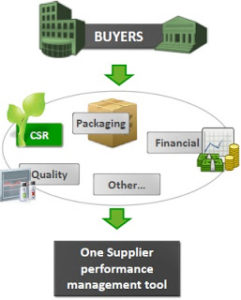Together with EcoVadis a handful of initiatives are developing global databases on suppliers CSR performance, such as CDP Supply Chain, SEDEX, GeSI/eTasc, Fair Factory Clearing House.
While the focus (geographical, sector, sustainability issues) of those initiatives is often quite different, we sometimes get the question from customers: Why don’t you guys collaborate? It would be much easier for us if our suppliers had only one single database to register in (and avoid us have to make tough choice between systems).
We at EcoVadis support the vision of collaboration between platforms in order to accelerate the adoption of. We are participating in the GSCP Data Exchange Working Group and in the past 3 years have implemented several integrations between our platforms and other systems. However having spent a lot of time working on these issues we would like to share a couple of (though provoking) lessons learned:
- This is no “#1 problem”: Suppliers CSR databases are only the tip of the iceberg. The vast majority of purchasing organisations are still using proprietary systems or audit protocols which create a much more important work duplication effort for suppliers. As a supplier I would much rather have those 50 customers using proprietary audits, joining one of the 3 systems available in my sector… than seeing the 3 systems collaborate to become 1.
- Focus needs to be on business rather than IT issues: The mistake is often to focus on the development of the IT protocols (ex: XML standards) which will enable data sharing… forgetting the business and governance issues. The opposite should be done. Until questions such as “Who owns the data?” “What are the commercial incentives for data providers to share data” “Who guarantees confidentiality and IP protection?” are addressed… the XML standards are useless.
- Need to maintain innovation: The scope (ex: type of sustainability issues covered) in the different systems is different. Interoperability should not lead to convergence around the “greatest common divisor” (i.e. exchanging only the basic data common between systems). On the contrary, smart and value creating integrations should try to combine the strengths of two systems to create a more robust solution for both suppliers and buyers.

One example of such value creating integrations are the one EcoVadis has developed in the past 3 years with Supplier Information Management (SIM) platforms (ex: Ariba/SAP, Ivalua, BravoSolution, etc.). Those systems cover a much wider scope that ours (i.e. beyond CSR, including Financial, Quality, Technical information) but don’t have the depth and reliably of EcoVadis on Sustainability Data. Integration is in this case a Win/Win situation where:
- Customers can access to a one stop shop for their information
- We ensure that EcoVadis data is really used by procurement managers and deeply integrated in procurement processes
SIM service providers enrich the value of their solutions and differentiate from competitors
Stay tuned for more information on new EcoVadis partnerships to be announced soon…
—
Article written by Pierre-François Thaler, Managing Director, EcoVadis
You can follow him on twitter @pierrov
Photo by opensourceway under Creative Commons license

